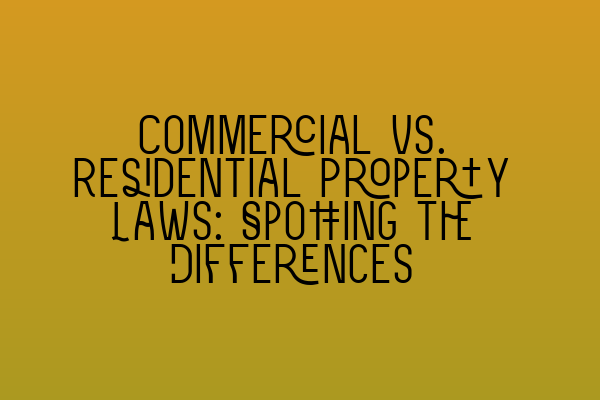Commercial vs. Residential Property Laws: Spotting the Differences
As property law solicitors, we often come across clients who are confused about the differences between commercial and residential properties. It’s understandable, as the laws governing these two types of properties can be quite distinct from each other. In this blog post, we will help you spot the differences and gain a better understanding of the legal framework surrounding commercial and residential properties.
Residential Properties:
When we talk about residential properties, we refer to properties that are primarily used for housing purposes. These can include single-family homes, apartments, condominiums, and townhouses. The laws and regulations governing residential properties are largely focused on protecting the rights and interests of tenants and homeowners.
One of the key legal concepts in residential property law is the landlord-tenant relationship. The laws are designed to ensure fair treatment for tenants and provide remedies in case of disputes. For example, there are specific rules governing the eviction process, security deposits, and habitability standards. It is important for landlords to be well-versed in these laws to avoid legal complications.
Additionally, residential properties are subject to zoning laws and building codes enforced by local governments. These regulations aim to maintain the quality of residential neighborhoods and ensure the safety and well-being of residents. It is crucial for property owners and developers to comply with these rules before undertaking any construction or renovation projects.
Commercial Properties:
On the other hand, commercial properties are intended for business purposes. These can include office buildings, retail spaces, warehouses, and industrial complexes. The laws governing commercial properties are more focused on facilitating business transactions and protecting the rights of both landlords and tenants.
One significant difference in commercial property law is the prevalence of commercial leases. Unlike residential leases, which are often covered by statutory laws, commercial leases are highly customizable and subject to negotiation between the parties involved. It is common for commercial leases to be for longer durations and include provisions for rent increases, maintenance responsibilities, and options to extend or terminate the lease.
Another key aspect of commercial property law is the regulation of commercial transactions. For example, the sale and purchase of commercial properties may involve complex contracts and due diligence processes. It is crucial to seek legal advice to navigate these transactions and ensure that all legal requirements are met.
Understanding the differences between commercial and residential property laws is essential for property owners, tenants, and investors. Whether you are considering starting a business, leasing a commercial space, or investing in property, having a good knowledge of the legal framework can help you make informed decisions. It can also help you anticipate potential legal issues and take appropriate measures to mitigate risks.
At SQE Property Law & Land Law, we offer comprehensive legal services for both commercial and residential property matters. Our expert solicitors can guide you through the intricacies of property law and ensure that your rights and interests are protected. Whether you need assistance with lease negotiations, property transactions, or resolving disputes, our team is here to help.
If you are preparing for the SQE exams, we also offer preparation courses and practice quizzes to help you succeed. Check out our related articles for more information on SQE 1 and SQE 2 preparation courses, practice exam questions, and important exam dates.
– SQE 1 Practice Exam Questions
– SQE 1 Practice Mocks FLK1 FLK2
– SQE 2 Preparation Courses
– SQE 1 Preparation Courses
– SRA SQE Exam Dates
In conclusion, the legal aspects of commercial and residential properties vary significantly. Residential properties are focused on tenant rights and habitability standards, while commercial properties are geared towards business transactions and customization through commercial leases. It is important to seek professional advice and understand the specific laws applicable to your situation. Contact us at SQE Property Law & Land Law for expert guidance in all your property law matters.
